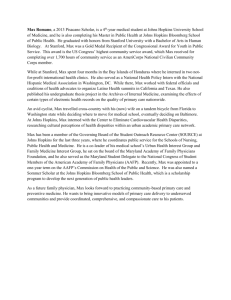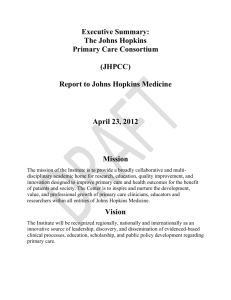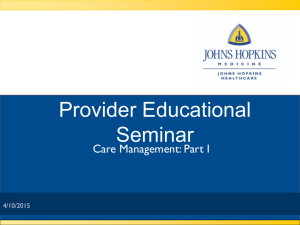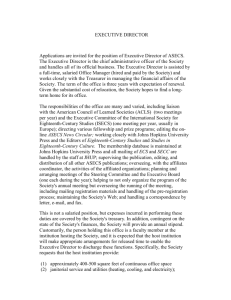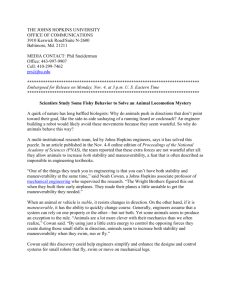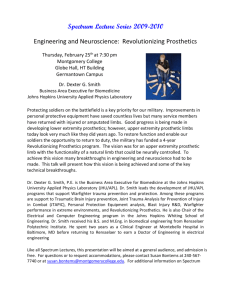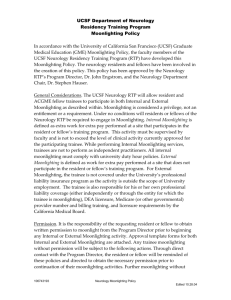Protocol Name: Blood and Blood Component Transfusion
advertisement
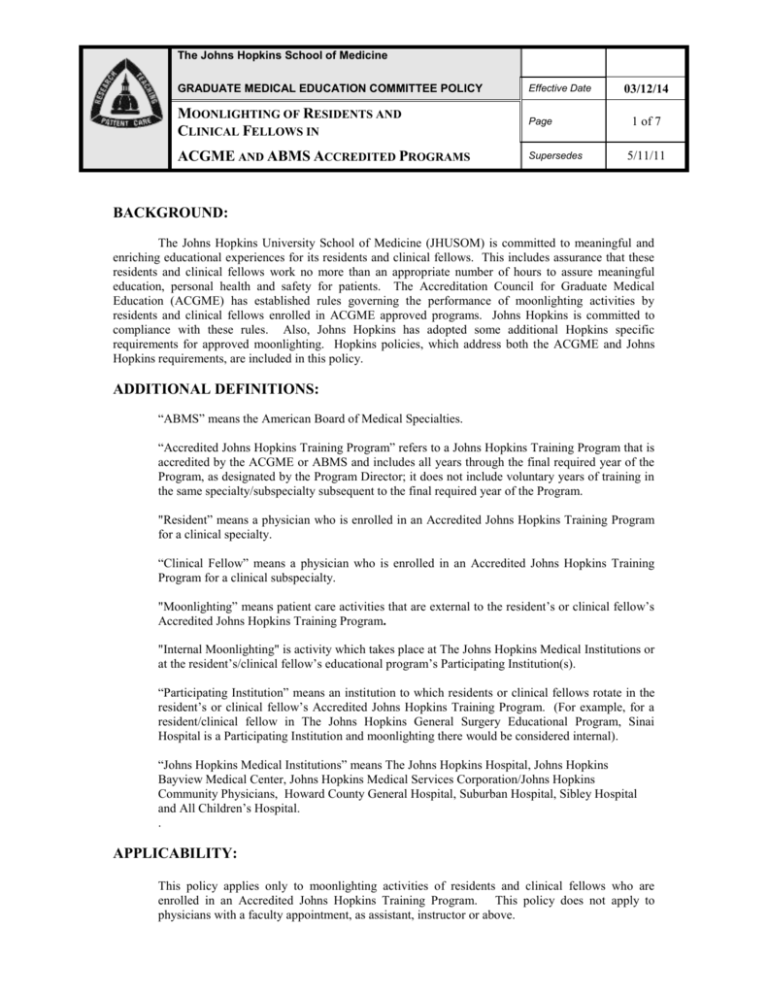
The Johns Hopkins School of Medicine GRADUATE MEDICAL EDUCATION COMMITTEE POLICY Effective Date MOONLIGHTING OF RESIDENTS AND CLINICAL FELLOWS IN Page ACGME AND ABMS ACCREDITED PROGRAMS Supersedes 03/12/14 1 of 7 5/11/11 BACKGROUND: The Johns Hopkins University School of Medicine (JHUSOM) is committed to meaningful and enriching educational experiences for its residents and clinical fellows. This includes assurance that these residents and clinical fellows work no more than an appropriate number of hours to assure meaningful education, personal health and safety for patients. The Accreditation Council for Graduate Medical Education (ACGME) has established rules governing the performance of moonlighting activities by residents and clinical fellows enrolled in ACGME approved programs. Johns Hopkins is committed to compliance with these rules. Also, Johns Hopkins has adopted some additional Hopkins specific requirements for approved moonlighting. Hopkins policies, which address both the ACGME and Johns Hopkins requirements, are included in this policy. ADDITIONAL DEFINITIONS: “ABMS” means the American Board of Medical Specialties. “Accredited Johns Hopkins Training Program” refers to a Johns Hopkins Training Program that is accredited by the ACGME or ABMS and includes all years through the final required year of the Program, as designated by the Program Director; it does not include voluntary years of training in the same specialty/subspecialty subsequent to the final required year of the Program. "Resident” means a physician who is enrolled in an Accredited Johns Hopkins Training Program for a clinical specialty. “Clinical Fellow” means a physician who is enrolled in an Accredited Johns Hopkins Training Program for a clinical subspecialty. "Moonlighting” means patient care activities that are external to the resident’s or clinical fellow’s Accredited Johns Hopkins Training Program. "Internal Moonlighting" is activity which takes place at The Johns Hopkins Medical Institutions or at the resident’s/clinical fellow’s educational program’s Participating Institution(s). “Participating Institution” means an institution to which residents or clinical fellows rotate in the resident’s or clinical fellow’s Accredited Johns Hopkins Training Program. (For example, for a resident/clinical fellow in The Johns Hopkins General Surgery Educational Program, Sinai Hospital is a Participating Institution and moonlighting there would be considered internal). “Johns Hopkins Medical Institutions” means The Johns Hopkins Hospital, Johns Hopkins Bayview Medical Center, Johns Hopkins Medical Services Corporation/Johns Hopkins Community Physicians, Howard County General Hospital, Suburban Hospital, Sibley Hospital and All Children’s Hospital. . APPLICABILITY: This policy applies only to moonlighting activities of residents and clinical fellows who are enrolled in an Accredited Johns Hopkins Training Program. This policy does not apply to physicians with a faculty appointment, as assistant, instructor or above. The Johns Hopkins School of Medicine GRADUATE MEDICAL EDUCATION COMMITTEE POLICY Effective Date MOONLIGHTING OF RESIDENTS AND CLINICAL FELLOWS IN Page ACGME AND ABMS ACCREDITED PROGRAMS Supersedes 03/12/14 2 of 7 5/11/11 CONDITIONS AND REQUIREMENTS: * A. No resident or clinical fellow may be required, as a condition of his or her Accredited Johns Hopkins Training Program, to perform moonlighting activities. B. Residents and clinical fellows in an Accredited Johns Hopkins Training Program may moonlight, but only after filing a Moonlighting Request Form* and receiving the signed approval of his/her Training Program Director, the representative of the moonlighting site and the Associate Dean for Graduate Medical Education. Approved Moonlighting Request Forms are to be made a part of the resident's/clinical fellow's file. C. Internal moonlighting is not permitted in the specialty/ subspecialty that is the subject of the resident’s/clinical fellow’s Accredited Johns Hopkins Training Program unless the Associate Dean for Graduate Medical Education grants a specific exception in a case where the moonlighting activities are not central to the resident’s/clinical fellow’s training program D. No resident or clinical fellow may moonlight without the resident/clinical fellow first having obtained both an unrestricted license to practice medicine and controlled dangerous substance registration in the state in which the moonlighting activity is to take place as well as DEA registration. E. No resident or clinical fellow may moonlight without first having been appropriately credentialled by the hospital or facility where the moonlighting is to occur. F. The number of hours worked by a resident or clinical fellow in moonlighting activities, together with the hours worked in the Accredited Johns Hopkins Training Program, may not exceed the ACGME guidelines for work hours for the resident’s/clinical fellow’s specialty/subspecialty. The Training Program Director for the resident or clinical fellow must approve and monitor the number of hours that the resident/clinical fellow may engage in moonlighting activities per week. G. Moonlighting activities are prohibited if they are inconsistent with the principles of providing residents/clinical fellows with sufficient time for rest and restoration to promote the resident’s/clinical fellow's educational experience and safe patient care. Therefore, the Training Program Director shall monitor the effect of moonlighting activities on resident/clinical fellow performance. The Training Program Director or the Associate Dean for Graduate Medical Education may withdraw permission for moonlighting activities at any time if they determine, in their sole discretion, that the moonlighting activity is having an adverse effect upon the resident’s/clinical fellow’s participation in the educational program in which he/she is enrolled. H. A resident or clinical fellow who intends to engage in and bill for moonlighting activities (directly or through his/her employer/contractor) must comply with the JHUSOM Policy Regarding Professional Fee Billing for Residents and Clinical Fellows in Accredited Programs. I. Residents and clinical fellows performing approved moonlighting activities at any of the Johns Hopkins Medical Institutions will be covered under Johns Hopkins Professional Attachment M to this policy The Johns Hopkins School of Medicine GRADUATE MEDICAL EDUCATION COMMITTEE POLICY Effective Date MOONLIGHTING OF RESIDENTS AND CLINICAL FELLOWS IN Page ACGME AND ABMS ACCREDITED PROGRAMS Supersedes 03/12/14 3 of 7 5/11/11 Liability Insurance. However, residents and clinical fellows performing approved moonlighting activities at any hospital/facility other than a Johns Hopkins Medical Institution will not be covered under Johns Hopkins Professional Liability Insurance. A resident or clinical fellow who intends to engage in moonlighting activities at hospitals/facilities other than the Johns Hopkins Medical Institutions must ensure that he/she will be covered by professional liability insurance at the location at which the moonlighting activities take place. NOTE: EVEN THOUGH MOONLIGHTING HOURS AT A PARTICIPATING INSTITUTION COUNT TOWARD COMPLIANCE WITH THE ACGME WORK HOURS GUIDELINES (SEE PARAGRAPH F ABOVE), THE RESIDENT/ CLINICAL FELLOW IS NOT COVERED BY JOHNS HOPKINS PROFESSIONAL LIABILITY INSURANCE FOR MOONLIGHTING ACTIVITIES AT A PARTICIPATING INSTITUTION UNLESS THAT INSTITUTION IS ONE OF THE JOHNS HOPKINS MEDICAL INSTITUTIONS, AS DEFINED ABOVE. J. An Accredited Johns Hopkins Training Program may adopt policies governing residents or clinical fellows in that program which are stricter than the conditions and requirements of this policy. The Johns Hopkins School of Medicine GRADUATE MEDICAL EDUCATION COMMITTEE POLICY Effective Date MOONLIGHTING OF RESIDENTS AND CLINICAL FELLOWS IN Page ACGME AND ABMS ACCREDITED PROGRAMS Supersedes 03/12/14 4 of 7 5/11/11 Attachment M MOONLIGHTING REQUEST FORM NAME: ____________________________________________________________________________ RESIDENT/CLINICAL FELLOW (Circle One) VISA STATUS (If applicable): ______________________________________________ ACGME/ABMS SPECIALTY OR SUBSPECIALTY PROGRAM: TRAINING PROGRAM DIRECTOR: _______________________________________________________________________ 1. Proposed moonlighting activity: 2. Location of this moonlighting activity: 3. Approximate number of hours per week to be spent in this activity: 4. Averaged over the last 30 days, number of hours per week spent in my training program 5. Billing at Johns Hopkins Medical Institutions (1) (JHMI) and at institutions to which physicians in my educational program rotate (participating institutions) (check one): I, or the JHMI/participating institution hiring department, intend(s) to bill payors for my moonlighting services Neither I, nor the JHMI/participating institution hiring department, intend(s) to bill payors for my moonlighting services I understand that if I intend to bill for my moonlighting activities (either directly or through my employer/contractor), I must comply with The Johns Hopkins University School of Medicine Policy Regarding Professional Fee Billing for Residents and Clinical Fellows in Accredited Programs. 6. 7. 8. I understand that the total number of hours to be worked in my moonlighting activities, together with the hours worked in my ACGME/ABMS educational program may not exceed the ACGME and GMEC guidelines for work hours. I understand that my Training Program Director must approve the specific number of hours that I may engage in moonlighting activities per week. The participating institutions in my educational program (if any) are . I understand that my Training Program Director will monitor my performance for the effect of moonlighting activities on my performance in my training program. I understand that the Training Program Director or the Associate Dean for Graduate Medical Education may withdraw permission for moonlighting activities at any time if they determine, in their sole discretion, that the moonlighting activity is having an adverse effect upon my educational program. (1) The Johns Hopkins Hospital, Johns Hopkins Bayview Medical Center, Johns Hopkins Medical Services Corporation/Johns Hopkins Community Physicians, Howard County General Hospital, Suburban Hospital, Sibley Hospital and All Children’s Hospital The Johns Hopkins School of Medicine GRADUATE MEDICAL EDUCATION COMMITTEE POLICY Effective Date MOONLIGHTING OF RESIDENTS AND CLINICAL FELLOWS IN Page ACGME AND ABMS ACCREDITED PROGRAMS Supersedes 03/12/14 5 of 7 5/11/11 9. I understand that I may not engage in moonlighting activities in the specialty/subspecialty that is the subject of my ACGME/ABMS educational program if the activity takes place in a Johns Hopkins Medical Institution or the participating institutions in my educational program (if any) as listed in Paragraph 6 above. 10. The chairman/division chief/medical director in the department/division/hospital/ facility where I wish to moonlight is: . 11. I understand that the person listed in Paragraph 9 above must sign this Moonlighting Request Form before I may submit it for consideration by my Training Program Director and the Associate Dean for Graduate Medical Education. 12. I have obtained an unrestricted license to practice medicine and controlled dangerous substance registration in the state in which the moonlighting is to take place as well as DEA registration 13. I understand that I must receive a medical staff appointment letter and an approved privilege delineation form from the hospital/facility where the moonlighting activity will take place before I begin the moonlighting activities. 14. I recognize that this activity is not an approved part of my educational program and must be approved by my Training Program Director and the Associate Dean for Graduate Medical Education. 15. I understand that I will be covered under Johns Hopkins professional liability insurance policy for moonlighting activities at The Johns Hopkins Medical Institutions. I understand that even though my moonlighting activities at my educational program’s participating institutions (if any) as listed in Paragraph 5 above count toward compliance with the duty hours rule limitation, I AM NOT COVERED BY HOPKINS PROFESSIONAL LIABILITY INSURANCE FOR MOONLIGHTING ACTIVITIES AT THOSE INSTITUTIONS PARTICIPATING IN MY EDUCATIONAL PROGRAM BUT WHICH ARE NOT PART OF THE JOHNS HOPKINS MEDICAL INSTITUTIONS. I understand that I am responsible for obtaining my own professional liability insurance for moonlighting activities at institutions other than the Johns Hopkins Medical Institutions. 16. I understand that a Johns Hopkins Medical Institution DEA number may not be used for moonlighting activities. 17. (If applicable) I will provide the described moonlighting activities in accordance with the pay and hour guidelines (limited to 600 hours during the approved time period) as set forth by The Johns Hopkins University School of Medicine Guidelines for Stipend Supplementation and Hour Limitation for Residents and Clinical Fellows. (See Attachment M-1.) __________________________________ Signature of Resident/Clinical Fellow _________________________ Date The Johns Hopkins School of Medicine GRADUATE MEDICAL EDUCATION COMMITTEE POLICY Effective Date MOONLIGHTING OF RESIDENTS AND CLINICAL FELLOWS IN Page ACGME AND ABMS ACCREDITED PROGRAMS Supersedes 03/12/14 6 of 7 5/11/11 APPROVAL OF REQUEST TO PERFORM MOONLIGHTING ACTIVITIES This approval covers the above described moonlighting activity for the period from exceed the end of the current academic year). __________________________________ Training Program Director _________________________ Date __________________________________ Chairman/Division Chief/Medical Director in the Department/Division/Hospital/Facility Where Moonlighting Will Take Place* _________________________ Date __________________________________ Associate Dean for Graduate Medical Education _________________________ Date to (not to *I understand that the hiring department/facility (JHMI or non-JHMI participating institution) must comply with the Johns Hopkins University School of Medicine Policy Regarding Professional Fee Billing for Residents and Clinical Fellows in Accredited Programs ************************************************************************ Return to Office for Graduate Medical Education, Miller Research Building, Suite 147, School of Medicine for Dean’s Office signature. Fully executed copies will be returned to the Training Program Coordinator and Resident/Clinical Fellow. cc: Senior Director, Office of Billing Quality Assurance, Reed Hall, Suite 220 Medical Staff Administrative Manager of Medical Staff Information Systems The Johns Hopkins School of Medicine GRADUATE MEDICAL EDUCATION COMMITTEE POLICY Effective Date MOONLIGHTING OF RESIDENTS AND CLINICAL FELLOWS IN Page ACGME AND ABMS ACCREDITED PROGRAMS Supersedes 03/12/14 7 of 7 5/11/11 ATTACHMENT M-1 JOHNS HOPKINS UNIVERSITY SCHOOL OF MEDICINE GUIDELINES FOR HOUR LIMITATION FOR TRAINEES The maximum time permitted for moonlighting activities is 600 hours per year. This policy applies to services rendered within the Johns Hopkins Medical Institutions that are separately identified from services which are part of the training program. The Training Program Director and the Associate Dean for Graduate Medical Education must approve all requests for extracurricular activities prior to initiation of such activities. A Moonlighting Request form and the Training Program Director's approval of the form must be submitted by the preceptor to the Associate Dean for Graduate Medical Education. After approval by the Associate Dean for Graduate Medical Education, the hiring department must: 1. Obtain preceptor approval before hiring 2. Give notification of hour (600) limitation 3. Notify preceptor when employment commences Office for Graduate Medical Education School of Medicine Rev. 12-13-06
